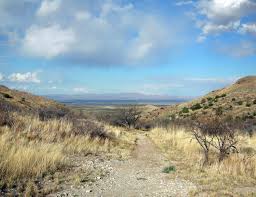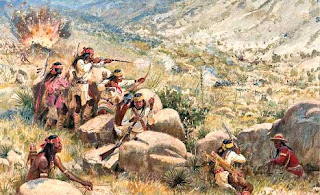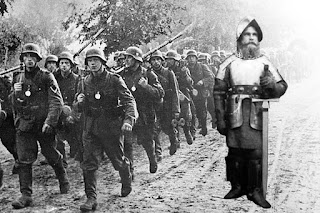America's First Medal of Honor & Never Ending War with the Apache: The Tragic Story of the Bascom Affair
Bernard John Dowling Irwin wan an Irish-born American army surgeon who on February 13, 1861 found himself the unlikely commander of a contingent of 14 soldiers of the United States Army’s 7th Infantry Division dispatched on a rescue mission to save 60 American cavalrymen who were surrounded and under siege by the great Apache warrior chief Cochise.
For his brave actions on that day Assistant Surgeon Bernard Irwin would go on to receive the Congressional Medal of Honor. And although, the Medal of Honor was not established as an award for bravery and valor above and beyond the call of duty in service to the United States until 1862 at the height of the American Civil War, Irwin’s deeds in defeating the great Apache warrior Cochise and rescuing his fellow cavalrymen on February 13, 1861 while surrounded by hostile Apaches, would make his Medal of Honor the earliest awarded for bravery in combat by date of action as it pre-dated the outbreak of the American Civil War by nearly two months.
Bernard Irwin was born in County Roscommon Ireland on June 24, 1830 and he immigrated to the United States with his family in the mid-1840’s just prior to the onset of the infamous Potato Famine. He served as a private in the New York State Militia and used his military connections to enter New York Medical College in 1850. Upon graduation from New York Medical College, Irwin was appointed an Assistant Surgeon in the United States Army in 1856. With his military commission as an officer in U.S. Army Irwin was deployed to outpost duty on the western frontier in present day Arizona, where a tense relationship then existed between settlers from the east and the Native American tribes of the Apache Nation.
 |
| Surgeon Bernard Irwin |
On January 27, 1861 farmer John Ward of Sonoita Creek, Arizona rode furiously on his horse into nearby Fort Buchanan. Fort Buchanan, recently erected and named after then sitting President James Buchanan was a mud and wooden fort that was home to elements of the 7th US Infantry Division as well as the 1st Dragoons of the United States Cavalry.
Frantically, Ward demanded to speak with Fort Buchanan’s commanding officer Colonel Morrison. Morrison was then in command of all United States military forces stationed inside the vast expanse of the Arizona Territory which had been won by the United States from Mexico at the conclusion of the Mexican-American War of 1845-1848.
Morrison came out onto the fort’s open parade ground to hear the urgent report of the frantic farmer Ward.
Ward was nearly beside himself and began speaking without even dismounting his horse. “They’ve taken my boy,” he said, “and the Apaches slaughtered all my cattle in the night.”
Morrison listened as local farmer John Ward recounted how an Apache war party led by their warrior Chief Cochise rode into his farm in the middle of the night, stole his cattle and kidnapped his twelve year old stepson Felix. It didn’t matter that Ward wasn’t actually present at the kidnapping, and had no idea what Cochise or any Apache Chief for that matter even looked like. Given the daring success of the raid on his farm, Colonel Morrison along with the entire U.S. Army garrison at Fort Buchanan instantly implicated Cochise and his band of Apaches based solely on their reputation.
Ward insisted that the Apache raiders had headed east toward the Chiricahua Mountains toward a place called Apache Pass, the home of Cochise and the Chiricahua Apaches.
 |
| U.S. Troops in Arizona |
Incensed by the raid Colonel Morrison instantly ordered Lieutenant Nicholas Bascom to lead a contingent of 60 cavalrymen of the 1st Dragoon Division eastward toward the Chiricahua Mountains and Apache Pass and bring Cochise and his men to justice by, “any means necessary.”
Seeking revenge and retribution Lieutenant Bascom and his 60 cavalrymen rode off in a cloud of dust toward Apache Pass. Apache Pass is the gateway to eastern Arizona, rising nearly 5000 feet up and cutting its way through the high peaked mountains of the Chiricahua, Apache Pass was home to Apache hunting parties as well as a constant flow of settlers and mail wagons heading westward to California.
Sending emissaries under a flag of truce, Lieutenant Bascom was able to secure a meeting with Cochise in a tent.
Cochise, though willing to talk because up until this point he and the Chiricahua Apaches have had a mostly peaceful relationship with American troops stationed within the Arizona Territory, was nonetheless suspicious of Bascom’s intentions and brought his nephews and brother with him to his meeting with the American Lieutenant whom he assumed must be a man of honor given his position as a commander of American troops.
 |
| Apache Leader Cochise |
Bascom confronted the Apache leader about the raid on Ward’s Farm. Cochise protected his people and asserted that he knew nothing of the raid or of the kidnapping.
Refusing to believe in the Apache’s innocence Bascom had Cochise and his entire family kept under guard and imprisoned inside the tent. Cochise was able to sneak out in the middle of the night by cutting a hole through the canvas wall of the tent, though guards were alerted as he attempted to flee and the Apache leader was forced to leave his brother and nephews behind.
Two days later Cochise sent a note to Bascom and requested that his family be freed. Bascom refused and wrote back that, “your family will be set free just as soon as the boy is released.”
Once again Cochise denied any involvement in the kidnapping of Felix Ward and he made one final plea for the release of his brother and nephews but his plea fell on deaf ears. Bascom and his cavalrymen, this time with hostages in tow, set off to find the Apache leader and bring him to justice.
Apache warriors encircled Bascom and his sixty men while they were fetching water along a creek near Apache Pass on February 7, 1861. Cochise was able to capture 3 cavalrymen of his own to hold in exchange for his family members when the ambush caught the American force by surprise.
 |
| Nicholas Bascom |
The 60 cavalrymen of the 1st Dragoons fought off repeated attempts by Cochise and his warriors to break through the American defenses, but with the Apaches controlling the high ground around the pass the American’s were completely cut off and trapped.
For days, seeking the release of his family members, Cochise and his forces kept up relentless pressure on the American cavalrymen. Several times Cochise attempted to exchange the three American soldiers he held in captivity in return for his brother and nephews but each time Bascom refused.
Not hearing any word from Bascom’s contingent, Assistant Surgeon Bernard Irwin volunteered to lead a rescue party to try and free the encircled soldiers.
Irwin and fourteen men of the 7th Infantry Division set out without any horses from Fort Buchanan since Bascom and his troops had taken all the available horses, and they began the dangerous 100 mile trek to Apache Pass on foot using the mules as pack animals.
On the 13th of February, Irwin and his small rescue party arrived near Apache Pass and were noticed by Cochise and his men. Irwin had the fourteen soldiers under his command move quickly from place to place in great circular marches in an attempt to confuse the Apache leader and make him believe that their rescue party was actually much larger than it really was. Irwin’s ruse worked and he did eventually get Cochise to flee from Apache Pass, breaking the siege of Bascom and his trapped cavalrymen.
According to the official Congressional citation Assistant Surgeon Irwin:
“Voluntarily took command of troops and attacked and defeated hostile Indians he met on the way. Surgeon Irwin volunteered to go to the rescue of 2nd Lt. George N. Bascom, who with 60 men was trapped by Chiricahua Apaches under Cochise. Irwin and 14 men, not having horses, began the 100 mile march riding mules. After fighting and capturing Indians, recovering stolen horses and cattle, he reached Bascom’s column and helped break the siege.”
The actions taken by Surgeon Bernard J.D. Irwin on February 13, 1861 would be remembered just prior to his retirement from the army as a Brigadier General in 1894 when he would be awarded the Congressional Medal of Honor.
 |
| Site of Apache Pass in Arizona |
After the arrival of Irwin and his relief party Cochise and his men would flee south to Sonora, Mexico, which was beyond the reach of the United States Army. Along the way, Cochise would torture, kill and dismember the three Americans that he had taken prisoner.
On February 19, 1861 the dismembered bodies of the slaughtered American’s were discovered lying in a dry creek bed by Bascom’s column. Upon the discovery of their remains the American troops promptly hanged the family members of Cochise.
When Cochise learned of the hanging of his family he vowed a never ending war against the United States of America. Though Cochise had nothing whatsoever to do with the initial raid on John Ward’s farm, or with the kidnapping of Felix Ward, the result of what history would forever remember as the Bascom Affair would lead to more than a quarter century of war between the United States and the Apache People.




Interesting that both the first US soldier to win the Medal of Honor and the first British soldier (Sgt.` Luke O'Connor) were both born in Co Roscommon.
ReplyDeleteThat should have read "the first British soldier (Sgt. Luke O'Connor) to win the Victoria Cross, were both born in Co Roscommon."
DeleteUmm, that would be the 7th Infantry Regiment, not Division, There were no Divisions prior to the Civil War. And the men Irwin was sent to relive were also of the 7th Infantry, not cavalrymen.
ReplyDeleteYup, creative history, indeed.
ReplyDelete